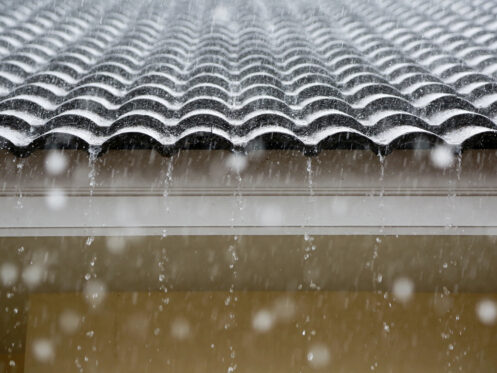North Carolina’s diverse climate, with its mix of hot, humid summers, heavy rainfall, and occasional winter freezes, significantly affects the health of residential foundations. Understanding how these seasonal changes contribute to foundation damage can help homeowners take preventative measures to protect their property. Here’s how North Carolina’s seasonal weather impacts foundation health and what steps you can take to avoid costly repairs.
1. Summer Heat and Dry Soil Conditions
During North Carolina’s hot summer months, soil moisture evaporates, causing the ground to dry and shrink. When the soil pulls away from the foundation, it leaves gaps that can lead to foundation settlement. This shifting ground creates uneven pressure on the foundation, resulting in cracks and structural instability. Foundation cracks caused by summer heat often appear around doors, windows, or in the basement walls.
Homeowners may also notice sloping floors or sticking doors and windows as signs of foundation movement. To combat the effects of dry soil, homeowners can water the soil around the foundation during prolonged dry spells, which helps maintain even soil moisture and reduce the risk of settling.
2. Heavy Rainfall and Soil Expansion
North Carolina experiences heavy rainfall, particularly during hurricane season and late spring. While rain is essential for replenishing dry soil, excessive moisture can saturate the ground around the foundation, leading to soil expansion. This expanded soil exerts pressure on the foundation walls, which can cause cracks, bowing, or bulging.
The increased hydrostatic pressure from saturated soil can also lead to basement leaks, further weakening the foundation. Proper drainage around the home, such as installing downspout extensions and maintaining clean gutters, can help manage water flow and reduce the risk of foundation damage due to excessive rain. Additionally, French drains or sump pumps can be useful in areas prone to flooding.
3. Winter Freezes and Thaw Cycles
Although North Carolina’s winters are generally mild, temperatures can still drop below freezing, causing soil to freeze and expand. This expansion can push against the foundation, leading to cracks or movement. When the temperature rises again, the frozen soil thaws, causing it to contract and pull away from the foundation.
This repeated cycle of freezing and thawing creates uneven stress, exacerbating existing cracks or creating new ones.
Foundation damage from winter weather may not be immediately noticeable, but over time, it can worsen and become a significant problem. To minimize these effects, homeowners should ensure their foundation is properly insulated and that the crawl space is adequately protected against cold temperatures.
4. The Impact of Seasonal Changes on North Carolina’s Soil Types
Different regions of North Carolina have varying soil types, each reacting differently to seasonal changes. For example, clay-rich soils are common in the Piedmont region and are highly reactive to moisture fluctuations. When wet, clay expands significantly; when dry, it contracts, leading to substantial shifts in the foundation.
In contrast, sandy soils found in coastal areas drain water more efficiently, but can still experience settling during droughts or heavy rainfall. Understanding the specific soil conditions around your property and how they respond to seasonal changes can help you take proactive measures to protect your foundation.
5. Preventive Measures to Protect Your Foundation
To mitigate the effects of seasonal weather on your foundation, consider these preventive steps:
- Maintain Proper Drainage: Ensure your gutters and downspouts direct water away from the foundation. Install downspout extensions if needed to prevent water pooling near the foundation.
- Water the Soil During Dry Periods: During summer, keep the soil around your foundation evenly moist to reduce the risk of soil shrinkage.
- Install a Sump Pump: For homes prone to basement flooding, a sump pump can help keep water away from the foundation, especially during heavy rainfall.
- Regular Inspections: Schedule professional inspections to catch early signs of foundation damage from weather, such as cracks, uneven floors, or water intrusion.
When To Call a Professional
If you notice signs of foundation damage—such as visible cracks in the walls, sticking doors and windows, or uneven floors—it’s time to call a professional. Addressing these issues early can prevent more extensive damage and costly repairs down the line. A professional can assess the condition of your foundation, identify any weather-related damage, and recommend appropriate solutions, such as crack repairs, drainage improvements, or foundation underpinning.
Need Foundation Repair Near North Carolina?
The seasonal weather in North Carolina can significantly impact your foundation’s health, making it important to understand how these changes affect your home. From the hot, dry summers to heavy rains and winter freezes, each season poses different risks. By taking preventive steps and seeking professional help when needed, you can safeguard your foundation from damage and maintain the long-term stability of your home. Ask us about our foundation repair!
If you’re concerned about your foundation’s condition or have noticed any warning signs, contact RhinoLift Foundation Solutions for a free inspection. We can help identify potential issues and recommend solutions tailored to North Carolina’s unique weather conditions. We also offer basement repair and waterproofing services!
Frequently Asked Questions
Are there specific times of year when foundation inspections are most important in North Carolina?
Yes, it’s especially wise to schedule inspections after periods of extreme weather, such as following a hot, dry summer or after heavy seasonal rains. These times are when soil movement and water intrusion are most likely to reveal or worsen foundation issues.
Can landscaping choices affect my foundation’s health during seasonal weather changes?
Absolutely. Planting trees or large shrubs too close to your home can lead to root growth that disturbs the soil and foundation. Additionally, improper grading or landscaping that directs water toward the house can increase the risk of water damage and soil erosion.
What are some long-term solutions for homes in areas with frequent foundation issues due to weather?
Long-term solutions include installing advanced drainage systems, using foundation piers or underpinning for added stability, and upgrading to moisture-resistant building materials. Consulting with a foundation specialist can help you determine the best strategies for your specific location and soil conditions.

